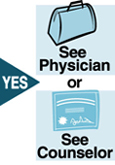 Anger
Anger
Anger is a natural reaction to frustrating and/or painful events in our lives. Most of us express our anger in harmless ways such as yelling, crying, slamming doors and hanging up the telephone. After a while, the anger goes away. When anger hangs on, though, it can make us enraged over little things or be expressed through violent acts.
Excessive anger can make us sick, not only mentally, but physically. In fact, millions of Americans experience the side effects of chronic anger in the form of illnesses, drug and alcohol addiction, headaches, domestic violence and depression just to name a few. Anger can also be a symptom of depression. (See “Depression”.) Angry outbursts can prevent us from having good relationships with others and feeling good about ourselves. On the other hand, learning to manage our anger can enhance our emotional well being and lead to a healthier, happier life.
Questions to Ask
Did your anger become problematic after a stroke, head injury, or head surgery? |
 |
|
|
|
|
 |
|
|
|
Does your anger result in physical or emotional harm to someone else or to yourself or does the anger result in destruction of property? |
 |
|
|
|
Do you have uncontrollable outbursts of anger when you drink or take any kind of drugs? |
 |
|
|
|
Is your anger the result of long term, excessive stress or a feeling of being powerless? |
 |
|
|
|
|
 |
|
|
|
For females, do you experience anger, especially if it leads to aggression, 10-14 days before your menstrual period? |
 |
|
|
|
|
|
Self-Help
|
|
Don’t ignore anger. Express it in a healthy and appropriate way:
|
|
|
Be assertive. Express your wants, needs and feelings in ways that do not offend others. Doing so can keep you from getting into situations in which you feel taken advantage of and get angry as a result. Use “I” rather than “you” statements. For example, say “I get angry when I feel put down by your comments in front of our friends.” Don’t say, “You make me angry when you put me down in front of our friends.” This allows you to take responsibility for your feelings. |
|
|
Make a list of the situations in which you feel excessive anger. This may include work, social and personal situations/relationships. See if there are any patterns to your anger and if they can be changed. |
|
|
Channel the energy anger brings into doing something positive or
creative. Understand that we have more control over anger than we realize.
|
|
|
Write out your anger, but keep it to yourself if expressing it out loud could bring unwanted consequences. |
|
|
Distract yourself. If you’re stuck in traffic, for example, try to accept the delay and recognize that it’s beyond your control. Instead of clenching the steering wheel, play pleasant music on the radio or listen to an interesting program. If you have a cassette or CD player in your car, buy and play tapes or CDs that are soothing for such situations. |
|
|
To lessen anger outbursts, think of what will happen as a result of your anger. |
|
|
Find humor in situations that result in anger. |
|
|
Practice learning to lighten up. |
|
|
Use stress management techniques on a routine basis. (See “Stress - Self-Help”.) |
|
|
Think before acting or speaking. Try to understand your anger and plan how you want to react or respond. |
|
|
Eat healthy foods. Eat at regular times. |
